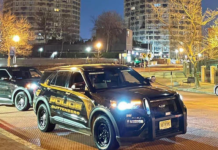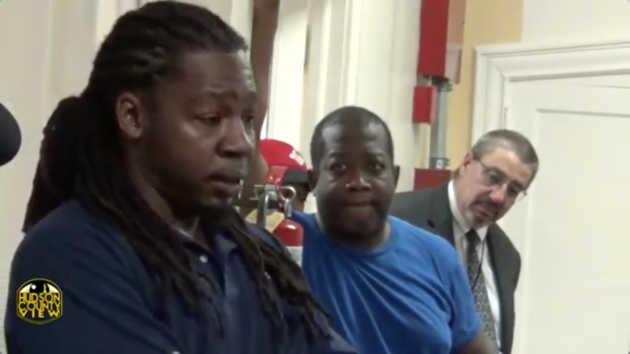The City of Jersey City has filed a federal lawsuit challenging a statewide policy that allows police officers to use cannabis off-duty ever since it was legalized in 2021.
“New Jersey is the only state in the country that doesn’t have carveouts for specific professions and when we talk about the split second decisions that they have to make, life and death often a part of that, the fact that the laws from the State of New Jersey directly conflict with the ATF and federal law exposes Jersey City to millions of dollars in actual liability,” Mayor Steven Fulop said at a press conference late this morning.
” … There is no way for a police department to know ingested or consumed a cannabis-related product one hour, one week, or three weeks prior to their shift. Think about the judgements that they have to make every day on a specific tour and you can realize the concerns that we have.”
In April 2021, then-Acting New Jersey Attorney General Matthew Platkin issued a directive stating that police officers are allowed to use marijuana while off duty, and Fulop, days after announcing his bid for governor, said Jersey City would not follow suit.
He said in a tweet thread April 20th of that year, a day that marijuana users often recognize as a day of celebration, that Jersey City police officers would still not be permitted to use marijuana, despite what the state determined, citing federal guidelines.
The 18-page federal lawsuit was filed by Public Safety Director James Shea and the city against the state, Platkin, the New Jersey Civil Service Commission, and five police officers who were fired after testing positive for marijuana.
That court filing cites the Cannabis Regulatory, Enforcement Assistance, and Marketplace Modernization (CREAMM) Act, which Jersey City contends makes it illegal to provide a firearm and/or ammunition to anyone who is a known marijuana user.
” … Which makes it illegal for any individual in the United States of America to possess, transfer, sell, [or] own a firearm if they are, and there’s a list of things, domestic violence abusers, etc., and on that list is a user of schedule 1 drugs.”
Fulop and Shea then had a question and answer session with the reporters on hand.
“Personally, I would like the State of New Jersey to correct this legislation: we are the only state in the country that doesn’t have reasonable carveouts for certain professions and that should be broader than just the police department,” Fulop said.
When asked by HCV if he planned on signing executive orders and/or directives to provide carveouts if elected governor, Fulop said he hoped the matter would be resolve long before then.
” … I think the State of New Jersey would agree with me that while they’re supportive of legalization, there also should be some reasonable carveouts, and we’re gonna push for that.”
On several occasions, the mayor used the example of a school bus driver using marijuana being a potentially very dangerous scenario, which is why New Jersey should be following parameters similar to New York.
As for Shea, he reiterated that under the CREAMM Act, which led to Hunter Biden being charged earlier this year, police officers cannot use marijuana and that should trump any state rules.
He also said the Federal Gun Control Act of 1968 says essentially the same thing.
“If I provide ammunition, then I am breaking the law if I know they are a marijuana user.”
He continued that alcohol is not on the federal list of Class I drugs or banned substances, pointing out that a woman in Virginia with a medical marijuana card and a legal firearm faced a weapons possession offense last year.
Shea further stated that two years after marijuana was legalized in New Jersey, there is still no way to test when marijuana was ingested.
He also mentioned that the five officers in question were offered public safety jobs that did not require carrying a firearm and they all declined.
Arthur Thibault, of the Warren-based law firm Apruzzese, McDermott, Mastro & Murphy P.C., explained that of the five officers who tested positive for marijuana, two who were terminated received a civil service decision to be reinstated (they are still terminated since they have filed a motion for reconsideration).
Police Officers Omar Polanco and Norhan Mansour, both represented by Michael Rubas, won their respective civil service cases, while Mackenzie Reilly, Montavious Patten, and Richie Lopez are awaiting decisions.
Shea added that all the drug tests administered to the officers in question were mandated by the New Jersey Attorney General’s Office at the time, though that policy has since been changed.
When asked why no other municipalities and/or police departments were taking this approach, Shea said he believed other departments shared their concerns, but they were happy to let someone else lead the charge.
“As far as I know, we are the only city doing this. I will refrain from impugning anyone else’s motives about why they’re doing what they’re doing, I suspect from my conversations, that there’s a lot of free riding going on,” he stated.
“If Jersey City is going to take the lead, we were the first ones, we saw the conflict immediately … we didn’t ask for this position, we were just the first ones to point it out … And everyone else in the state seems to be like ‘oh great, Jersey City is paying for the attorneys, Jersey City is taking the lead on this, we’ll wait until they get a ruling.'”
City officials said they were unsure how much has been spent on legal fees on the aforementioned five cases brought forth by police officers.
The AG’s office did not immediately return an email seeking comment, but an April 13th, 2022 memo from Platkin says that while the CREAMMA Act prevents drug and alcohol use while on duty, employers cannot take adverse action for marijuana use off duty unless there is suspicion they went to work impaired.
“The CREAMMA further provides that law enforcement agencies may not take any adverse action against any officers because they do or do not use cannabis off-duty,” he wrote.
“But should there be reasonable suspicion of an officer’s use of cannabis while engaged in the performance of their duties, or upon finding any observable signs of intoxication related to cannabis use (including following a work-related accident subject to investigation by the agency), that officer may be required to undergo a drug test. N.J.S.A. 24:6I-52(a)(1).”









Kinda weird to be doing this and having Fulops wife open a dispensary in Hoboken at the same time.